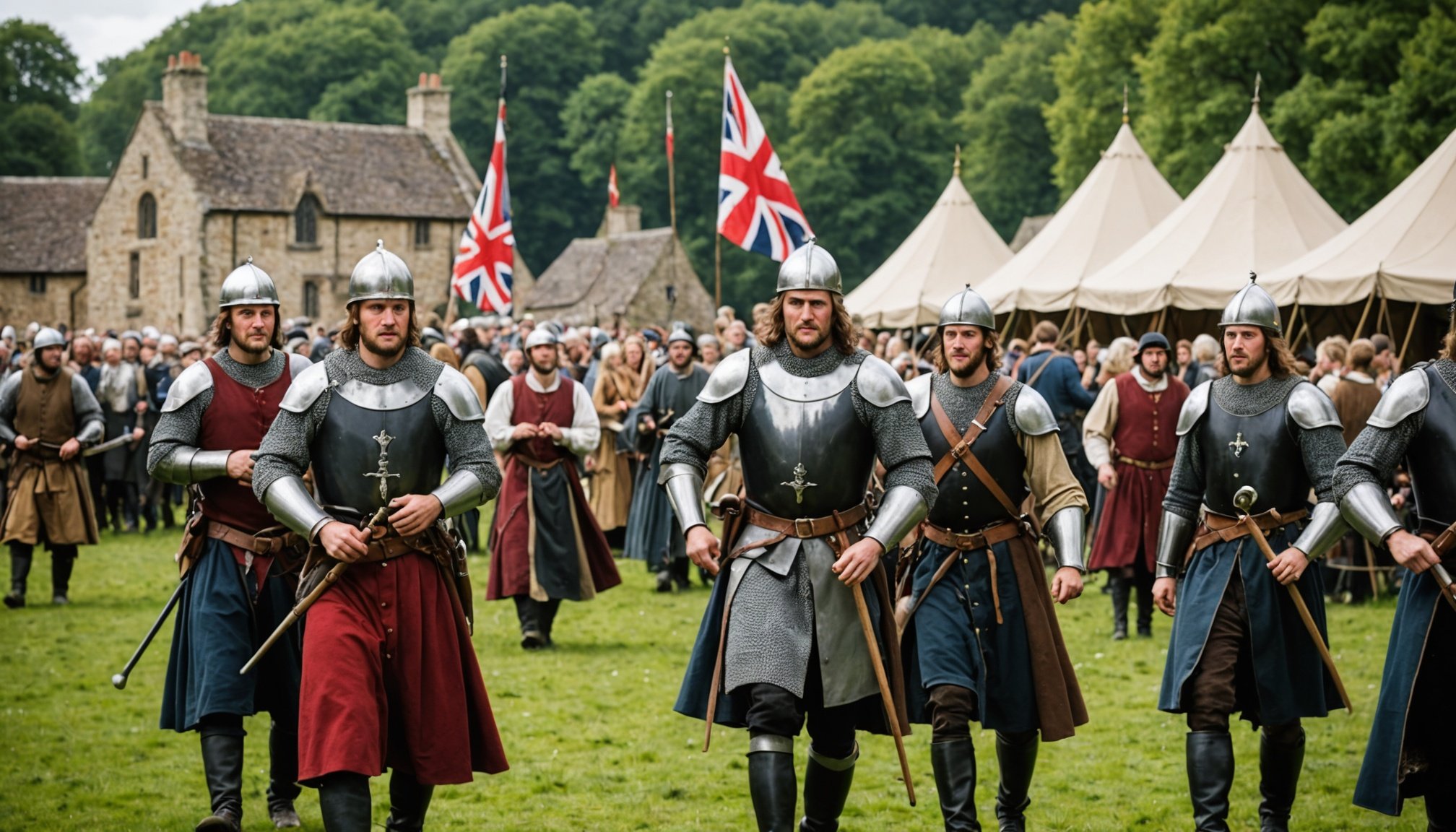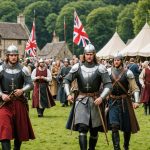Overview of Medieval Festivals in the UK
Medieval festivals in the UK are spectacularly popular, preserving British culture and showing the impact of historical events. They are crucial in highlighting the rich history and traditions that have shaped the nation. These events offer a blend of entertainment and education, making them significant pillars in the preservation of British heritage.
Attendees can expect a wide array of activities, ranging from traditional jousting tournaments and archery displays to historical reenactments and storytelling. Each activity is carefully designed to offer a glimpse into medieval life and allows participants to experience the vibrant atmosphere of the past. Additionally, performances by musicians and jesters create a lively ambiance reminiscent of medieval times.
Also to discover : Discover the Hidden Routes of Ancient Rome: Must-See Guided Tours Across the UK
A prominent feature of these festivals is the emphasis on genuine craftsmanship. Artisans and craftsmen are vital in bringing authenticity to medieval-themed events, showcasing traditional skills and techniques from the period. From blacksmithing to weaving, these crafts are not only displayed but also actively demonstrated, allowing attendees to witness firsthand the artisanal skills that were essential in the medieval era.
Medieval festivals, therefore, serve as both a celebration and an educational experience, enthralling hundreds with a tangible connection to Britain’s storied past.
Also to discover : Explore the Best UK Cities for Iconic Guided Tours into British Publishing Heritage
Top Medieval Festivals to Attend
In the realm of UK events, best medieval festivals captivate attendees with a diverse array of attractions and craftsmanship. This festival guide highlights some outstanding festivals that bring history and culture to life.
Festival Name 1
Dates and location: This enchanting festival takes place every summer in a historic castle setting.
Activities and attractions: Visitors can enjoy authentic medieval feasts, skillful jousting, and engaging storytelling sessions. A highlight is the archery contest, where participants can test their accuracy.
Insights on craftsmanship featured: Noteworthy craftsmen offer demonstrations on traditional crafts, including leatherwork and pottery. Engaging with these artisans presents a unique opportunity to learn about age-old techniques and the craftsmanship that characterised medieval life.
Festival Name 2
Dates and location: Set against a picturesque rural backdrop, this festival unfolds in early autumn.
Activities and attractions: Experience captivating falconry displays and intricate dance performances. The festival’s marketplace buzzes with vendors selling handcrafted goods and medieval garments.
Insights on craftsmanship featured: Attendees can observe artisanal skills like glassblowing and metalworking. These demonstrations provide insight into the meticulous artistry that embodies genuine craftsmanship.
H2 – Immersive Experiences at Medieval Festivals
For those seeking cultural immersion at medieval festivals, participation in historical reenactments and workshops provides a unique opportunity to delve deep into the past. These immersive experiences offer a vivid portrayal of historical events, allowing attendees to become active participants.
Overview of Immersive Activities
Various activities cater to different interests and age groups. From donning period-accurate clothing to engaging in epic battles, these experiences are designed to transport visitors to a bygone era. Workshops provide hands-on learning, where participants can try their hand at medieval crafts under the guidance of skilled instructors.
Importance of Participation
Engaging in these reenactments and workshops not only entertains but also educates, as attendees gain firsthand knowledge about the historical context and intricacies of the era. Participation enhances the understanding of historical narratives, making the learning experience both exciting and memorable.
Enhancing Historical Understanding
By immersing themselves in these activities, visitors can develop a profound appreciation for historical accuracy and artistry. Such experiences offer a tangible connection to the past, fostering a lasting interest in British culture and its historical impact. Engaging in these festivals becomes a remarkable journey into history.
Craftsmanship Highlights from Medieval Festivals
Medieval festivals in the UK offer a vibrant display of genuine craftsmanship, intertwining historical education with artistic flair. These festivals feature an array of traditional crafts, providing both a tactile and visual treat for attendees.
Spotlight on Local Artisans
Visitors to these festivals have the rare chance to witness artisanal skills that characterised medieval life. Craftspeople demonstrate a variety of crafts, from blacksmithing, a skill forged in fire and foundational to the era, to intricate weaving that showcases the era’s textile artistry. Each craftsperson plays a pivotal role in reviving and offering insights into historical techniques, ensuring these skills remain cherished and understood. Engaging with these local artisans presents an invaluable opportunity to learn about the tools and techniques that shaped medieval society.
Workshops and Demonstrations
Hands-on workshops provide festival-goers with avenues for immersive learning. Participants eager to delve deeper can engage in workshops like pottery or leather crafting, getting a feel for the meticulous detail involved in these traditional arts. These workshops, led by skilled artisans, not only allow attendees to create their own artefacts but also foster appreciation for the painstaking craft involved. Many artisans and participants share success stories, revealing how these workshops inspire a renewed interest in craftsmanship rooted in history.
Tips for Visiting Medieval Festivals
Visiting medieval festivals in the UK is both exhilarating and educational. Achieving an optimal experience involves thoughtful planning and preparation.
Best Times to Visit
Timing is everything. Arrive early or after peak hours to avoid large crowds, especially for popular UK events. Festivals usually unfold during summer and early autumn, providing seasonal weather ideal for exploring outdoor attractions.
What to Bring and Wear
Comfort is key. Don lightweight, breathable clothing for warmer days, and bring rain gear to prepare for unpredictable British weather. Comfy shoes are a must for all the walking. Capture memories, but pack gadgets in waterproof cases.
Navigating Crowds
Effective crowd navigation can greatly enhance your festival experience. Sketch a plan of key activities and exhibits you wish to see, prioritising them so you don’t miss out. Be punctual for attractions with scheduled times, like performances or reenactments. Enjoy unrestricted areas to absorb the ambiance during high congestion, and divert to stalls with lesser queues.
These festival tips will ensure a satisfying and memorable time. With a bit of foresight, you’ll seamlessly explore, learn, and immerse yourself in the rich tapestry of British culture at these historic events.
Conclusion and Resources
For those eager to explore medieval festivals in the UK, understanding their significance and impact on British culture is key. These events not only serve as colourful reenactments but also play a pivotal role in preserving Britain’s historical narratives. To plan your visit, several medieval festival resources are available, offering valuable insights and travel tips.
When preparing for these immersive experiences, it’s essential to seek out credible further reading sources. Books like “The Time Traveler’s Guide to Medieval England” by Ian Mortimer offer an engaging dive into the sights, sounds, and daily lives of the era. Such resources aid in appreciating the true authenticity woven into the festival activities.
Websites like the Historical UK portal provide travel tips and detailed festival listings, ensuring an informed exploration. By accessing these recommended sources, visitors can gain a deeper understanding of the historical events and craftsmanship celebrated at these festivals.
Continued support for historical and cultural events is vital for sustaining and promoting Britain’s rich heritage. By attending these festivals and engaging with available resources, individuals contribute to the ongoing appreciation and understanding of medieval history.








